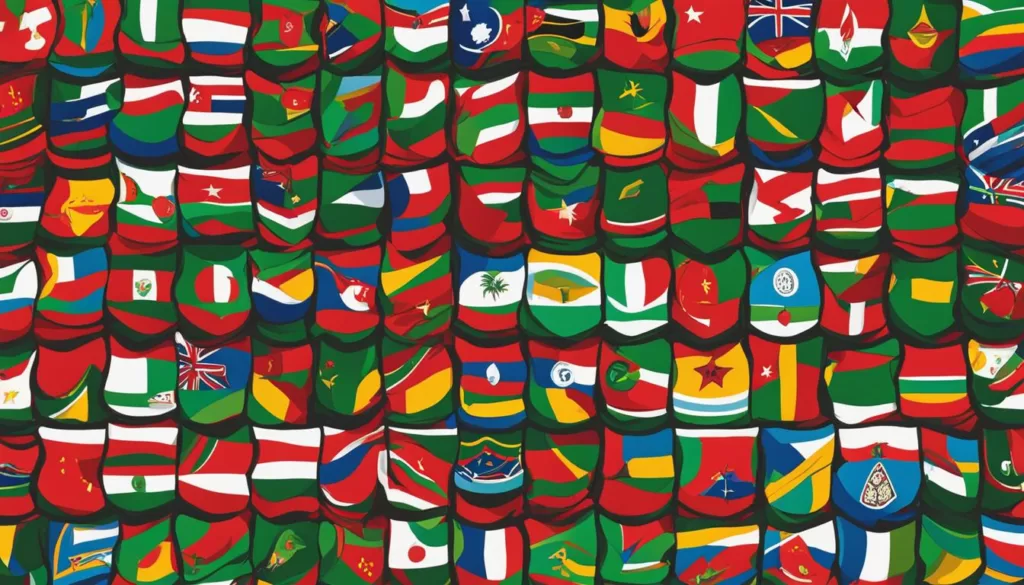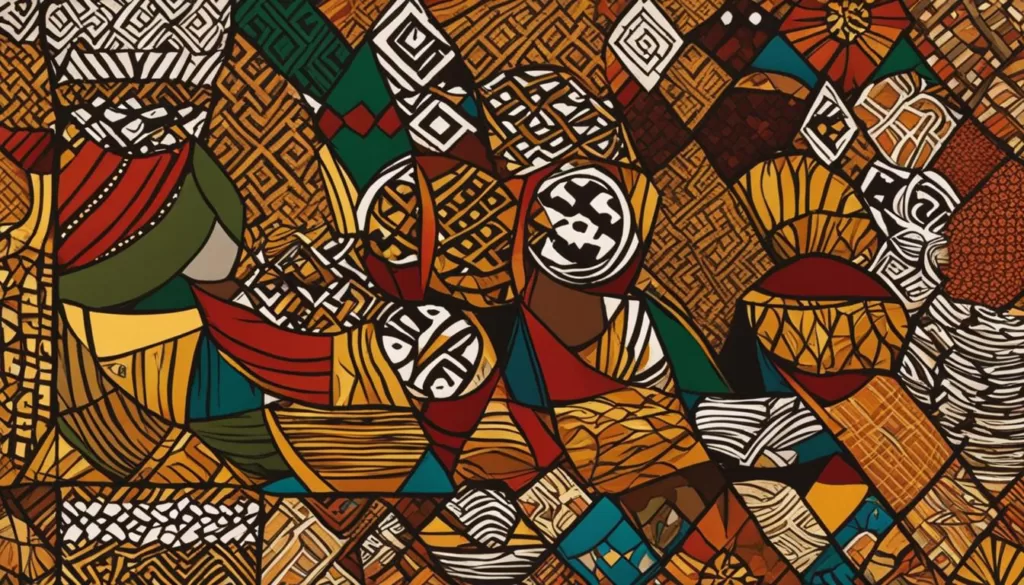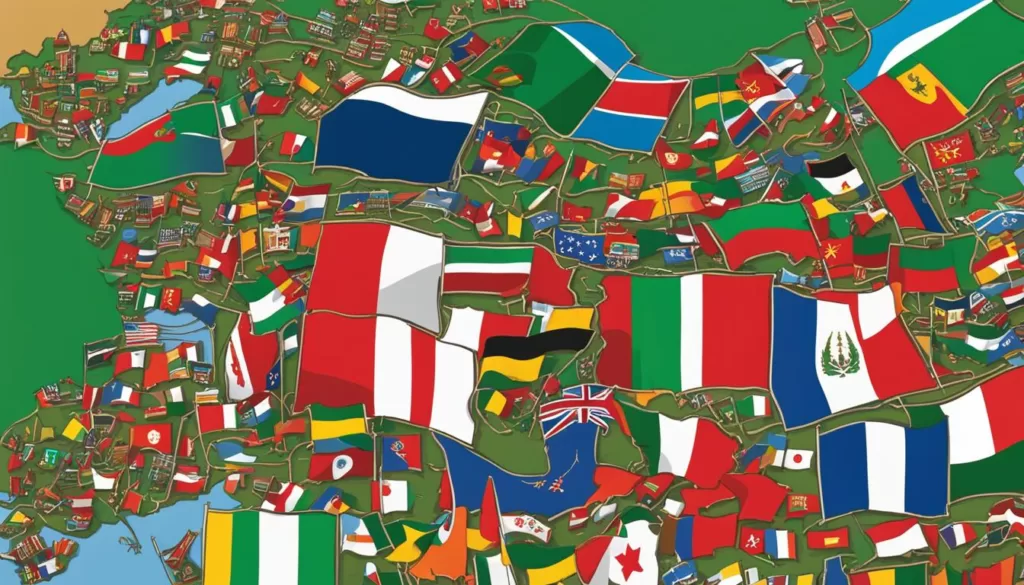Delving into the heart of Africa, Burundi presents a vibrant tapestry of languages, reflecting rich cultural significance and a dynamic blend of indigenous and global influences. In the realm of languages spoken in Burundi, one finds an intricate interplay between the national Bantu languages and relics of its colonial past. As we explore Burundi’s linguistic diversity, we discover how these languages not only facilitate communication but also shape the nation’s identity and social fabric.
Key Takeaways
- Kirundi, as the national language, plays a pivotal role in unifying Burundi’s population.
- French and English serve as official languages, though their use is not as widespread as Kirundi.
- Swahili is instrumental in trade and communication with the East African community, despite not being official.
- The linguistic diversity in Burundi is a testament to its historical layers and cultural intersections.
- Understanding the linguistic landscape is key to appreciating the full picture of Burundi’s societal dynamics.
- The blend of languages in Burundi serves as a powerful conduit for cohesion and cultural significance.
The Official and National Languages of Burundi

Burundi’s linguistic landscape serves as a testament to its historical narrative and cultural pillars. The harmonious blend of native and foreign languages reflects the lifeblood of the nation, ensuring communication, governance, and a sense of belonging among its people. The official languages of Burundi—Kirundi, French, and English—each carry their own cultural significance and influence, shaping the country’s language policy and reflecting the broader dynamics within the East African Community.
Kirundi: The Unifying National Language
The Kirundi language, a Bantu tongue, is the heartbeat of Burundi’s national identity. Spoken by the overwhelming majority, Kirundi echoes through the hills and communities, uniting its people in a shared linguistic heritage. It is the voice of folktales, the medium of education, and the cornerstone of everyday life. As enshrined in Burundi’s constitution, Kirundi’s role extends beyond mere communication—it is woven into the very fabric of the nation’s collective consciousness.
French and English: Colonial Legacy and Modern Official Languages
Tracing its roots to the era of colonial administration, the French language in Burundi lingers as a vestige of Belgian oversight. Officially sanctioned, French straddles the domains of government and elite societal transactions. Despite its significant post on paper, it garners fluency only among a select fraction of Burundians. Comparatively, English—installed later in the nation’s linguistic repertoire—essentially caters to diplomatic and regional integration objectives. As the East African Community’s lingua franca, English in Burundi finds itself poised for a strategic, albeit embryonic, role in the nation’s future engagements.
The Influence of the East African Community on Language Policy
The ascension of English as an official language reflects Burundi’s pivot towards regional synergy. The East African Community, a beacon of collective progress, champions English for its utilitarian reach across borders. This paradigm shift spotlights the nuanced calibration of Burundi’s language policy. The push for English is not merely a nod to globalization—it is a conscious stride towards harmonizing with neighboring states, embracing commonalities, and participating fully in regional dialogues and markets.
“Our languages reflect our past but also map out our connections within the East African sphere and the wider globe.”
| Language | Status in Burundi | Approximate Fluent Speakers | Notable Functions |
|---|---|---|---|
| Kirundi | National Language | Majority of the population | Primary medium for education, local communication, and cultural identity |
| French | Official Language | 3-10% of the population | Government, business, and higher education |
| English | Official Language | Minimal presence | Regional integration, international diplomacy |
Languages Spoken in Burundi: Bridging Ethnicities and Cultures

In the rich tapestry of Burundi’s society, languages play a critical role in fostering cultural integration and bridging ethnicities. At the core of this linguistic landscape is Kirundi—the heartbeat of the nation and a beacon of linguistic homogeneity in sub-Saharan Africa. The significance of Kirundi stretches beyond its function as one of Burundi’s main languages; it acts as a connector across various ethnic groups, particularly Hutu and Tutsi, who have historically been divided.
The use of Kirundi across different communities exemplifies the unique position Burundi holds, where a single indigenous language bolsters nation-wide communication and unity. Amidst a backdrop of ethnic diversity, Kirundi stands out as a shared linguistic thread, weaving together the country’s social and ethnic fabric. By underscoring linguistic homogeneity, Kirundi facilitates a shared understanding and a collective national identity, essential for the progress and harmony of Burundi.
“In the mosaic of Burundi’s cultures, Kirundi emerges as a resonant symbol of unity, intertwining the diversity of souls into one nation.”
| Language | Speaker Population | Prominence | Contribution to Cultural Integration |
|---|---|---|---|
| Kirundi | Majority | National | Unites various ethnic groups, fosters national identity |
| French | 3-10% | Official | Used in government, business, and education; bridges Burundi with Francophone countries |
| English | Minimal | Official | Facilitates regional integration and international diplomacy |
The intertwining of Kirundi, French, and English paints a picture of a nation that is rooted in its traditional values while also reaching out towards global and regional platforms. It is this very polyphony of voices that not only enriches Burundi’s cultural legacy but also strengthens its capability for cultural integration. As we witness the efforts to bridge ethnicities, it becomes evident that language is more than a tool for communication—it is a vessel for unity and solidarity.
Minority and Indigenous Languages in Burundi
The cultural and linguistic landscape of Burundi is rich and varied with several indigenous tongues playing crucial roles in the nation’s socio-economic life. Among these, Swahili in Burundi emerges not only as a crucial minority language but also as an agent of trade and a bridge to regional integration. Traditionally, minority languages in Burundi have laid the groundwork for cross-cultural interaction and economic transactions, contributing to the nation’s diverse yet cohesive identity.

While the major languages spoken in Burundi receive official recognition, it’s the non-official varieties that often facilitate the most dynamic exchanges. Despite not being granted official status, the usage of minority languages such as Swahili speaks to Burundi’s complex history and its present-day connections within the East African community.
Swahili: The Lingua Franca of Trade and Regional Integration
Swahili’s presence in Burundi is a vestige of the nation’s time under German rule, yet its utility has transcended the colonial context to become a vital tool in modern commerce and international diplomacy. This language has carved out a substantial niche in the economic life of Burundi, being extensively used in marketplaces, by the Muslim minority, and in encounters with neighboring East African nations. Swahili’s role as a language of trade is not only functional but also symbolic, reinforcing Burundi’s commitment to economic cohesion and collaborative ventures within the region.
“Swahili stands as a testament to Burundi’s adaptability and forward-looking stance in leveraging linguistic diversity for economic prosperity and regional cooperation.”
| Language | Role in Burundi | Speakers | Significance in Regional Context |
|---|---|---|---|
| Kirundi | National Language | Majority Population | Unifies Ethnically Diverse Groups |
| French | Official Language | 3-10% of Population | Connects to Francophonie |
| English | Official Language | Minimal Presence | Strengthens East African Community Ties |
| Swahili | Minority Language | Used Widely in Trades and Commerce | Promotes Trade and Integration with Neighbors |
Understanding the nuances of minority languages in Burundi is crucial for grasping the nation’s cultural and economic pulse. The prevalence of Swahili alongside other indigenous tongues underscores the multiplicity of voices contributing to the nation’s narrative. It affords a panoramic view of how, even in the absence of official endorsement, a language can become instrumental in boosting regional integration and mutual understanding, propelling Burundi forward in its journey of growth and cooperation.
Foreign Languages and Their Spheres of Influence in Burundi
In the colorful mosaic of Burundi’s language scene, the influence of foreign languages in Burundi punctuates the country’s socio-linguistic narrative with shades of its historical ties to the Francophonie and its aspirations within international communities. While Kirundi remains the dominant voice echoing across the nation’s valleys, the presence of French and English narrates a story of cultural intertwinement and international languages in Burundi’s society. The linguistic influence of Burundi’s official foreign languages frames the country’s dialogue with the world, reflecting its colonial history, current geopolitics, and the globalized fabric of today’s interconnected societies.
Within the government corridors and the halls of education, French serves as a bridge to the Francophonie, enshrining France’s cultural footprint in the modern Burundi lexicon. Its utilization in official domains is further certified by a pool of French-fluent minorities, who navigate the complexities of administrative, political, and academic realms. This enduring footprint is augmented by vernacular French, which embraces Kirundi loanwords, crafting a uniquely Burundian dialect reflective of the nation’s linguistic mosaic.
Despite its status as an official language, English operates on the periphery of Burundi’s linguistic ecosystem, its usage sparsely sprinkled among the populace. Instead, its role is notably strategic—English stands as a critical connector within the East African Community, hinting at Burundi’s future in regional partnerships and the web of international languages. Nevertheless, the widespread fluency and everyday chatter remain resonant in Kirundi’s tones, with English’s influence more restrained, a testament to the local community’s linguistic preferences and priorities.
As a member of the Francophonie, Burundi’s investment in the French language underscores its place in a global network of French-speaking nations, where linguistic alliances foster cultural exchange and collective endeavors. This affiliation with the Francophonie not only reinforces Burundi’s cultural ties but also amplifies its voice within an influential international forum.

Ultimately, the spheres of influence cast by foreign languages in Burundi serve not only as reminders of the past but also as instruments that can potentially propel the nation into heightened regional and international engagement. Maintaining a balance between honoring the past and navigating the currents of international discourse, Burundi’s language policies reflect the intricate dance of preserving a national linguistic identity while embracing foreign languages as beacons of global interaction and development.
Conclusion
In the journey to understanding Burundi’s languages, we gain insight into a nation’s soul, where the threads of a rich linguistic legacy intricately weave together a society. The predominance of Kirundi as a core element of Burundi’s linguistic identity stands as a harmonious force, fostering unity and a sense of collective belonging. This centrality of the national language supports our premise that fostering unity through language is pivotal for the cohesion of a nation as ethnically diverse as Burundi.
Simultaneously, the historical and modern-day status of French and the strategic integration of English into the nation’s vernacular embody Burundi’s diplomatic engagement with the Francophonie and the East African Community. This duality showcases Burundi’s ability to embrace linguistic diversity while maintaining the unique cultural resonance of its people. In understanding and navigating this multilingual landscape, Burundi leverages its linguistic assets as enablers of cultural exchange, economic collaboration, and regional connectivity.
As the country progresses, its linguistic narrative continues to evolve, narrating a story of resilience and adaptability. To comprehend the full scope of this narrative is to recognize how language serves not just in communication but as a beacon for unity—linking past to present, individual to community, and nation to region. The careful nurturing and promotion of its languages bodes well for Burundi’s aspirations to interact more dynamically within the tapestry of East Africa, bridging gaps and fostering broader understanding and alliances. Indeed, as Burundi charts its course, its multilingual fabric will likely be a cornerstone in the collective effort of uniting a region and empowering its people.
FAQ
What are the main languages spoken in Burundi?
Burundi is distinctly multilingual, with Kirundi as the national and unifying language spoken by the majority of the population. Additionally, French and English are the official languages, with French’s fluency more common among the educated elite, and English less so. The Bantu languages are also part of the linguistic mosaic of Burundi, with Swahili used extensively in trade and by the Muslim minority, despite not being official.
What is the national language of Burundi and why is it significant?
Kirundi is the national language of Burundi and holds great cultural significance as it is spoken by almost the entire population. It plays a pivotal role in fostering national unity and cultural integration, serving as a common thread among the country’s different ethnic groups.
How have French and English become official languages in Burundi?
French gained its official status during the period of Belgian colonial rule and continues to influence government, administration, and education in Burundi. English was more recently adopted as an official language to strengthen Burundi’s ties with the East African Community and enhance regional cooperation, despite its relatively limited use in everyday life in Burundi.
Can you explain the influence of the East African Community on language policy in Burundi?
The East African Community (EAC) has impacted Burundi’s language policy primarily through the adoption of English as an official language. This was a strategic move aimed at facilitating better integration into the EAC and improving communication and trade with other English-speaking member countries.
How does linguistic diversity in Burundi contribute to cultural integration?
Despite its complex history, Burundi exhibits a rare case of linguistic homogeneity in sub-Saharan Africa. The widespread use of Kirundi across various ethnic groups, mainly the Hutu and Tutsi, has been instrumental in bridging ethnicities and promoting a sense of unity and cultural cohesion.
What role does Swahili play in Burundi’s society?
Swahili plays a significant role in Burundi’s society, especially in the realms of trade and communication with the East African region. It acts as a lingua franca, particularly for the Muslim minority and is an important tool for those engaging in commerce and wishing to integrate regionally.
How prevalent are foreign languages like French and English in Burundi?
While French and English are official languages of Burundi, their prevalence varies. French is still widely used within government and higher education sectors, reflecting Belgium’s colonial influence. English is less pervasive in day-to-day interactions, mostly utilized within the context of regional affairs and by the business elite.
What does understanding the languages spoken in Burundi reveal about its culture?
Understanding the languages spoken in Burundi offers insights into the nation’s rich cultural tapestry. It showcases the enduring importance of Kirundi in uniting the population, reflects on the lasting impact of French colonialism, and reveals strategic engagements with the global and regional community via English. Such linguistic diversity underpins Burundi’s complex history and aspirations for a unified national and regional presence.






